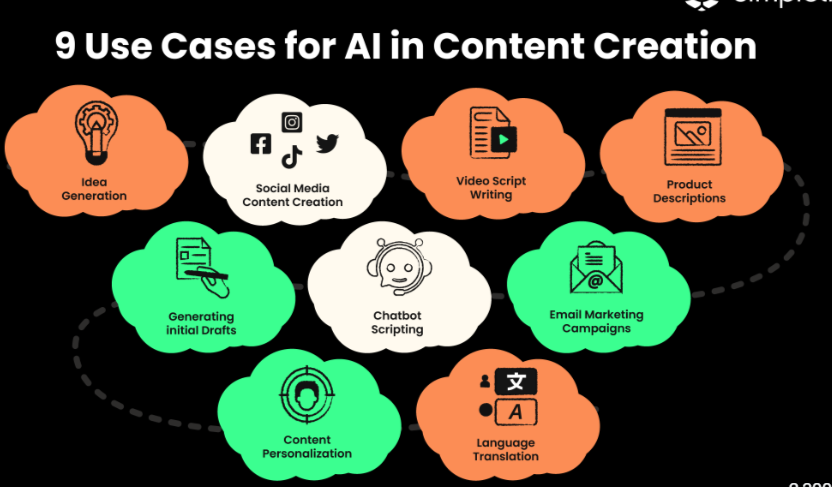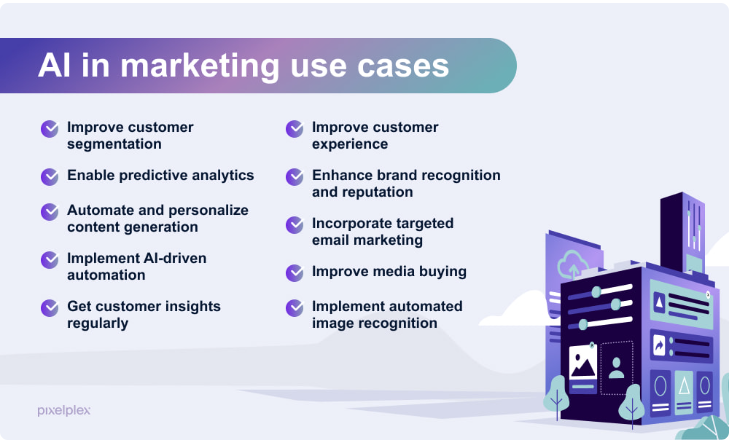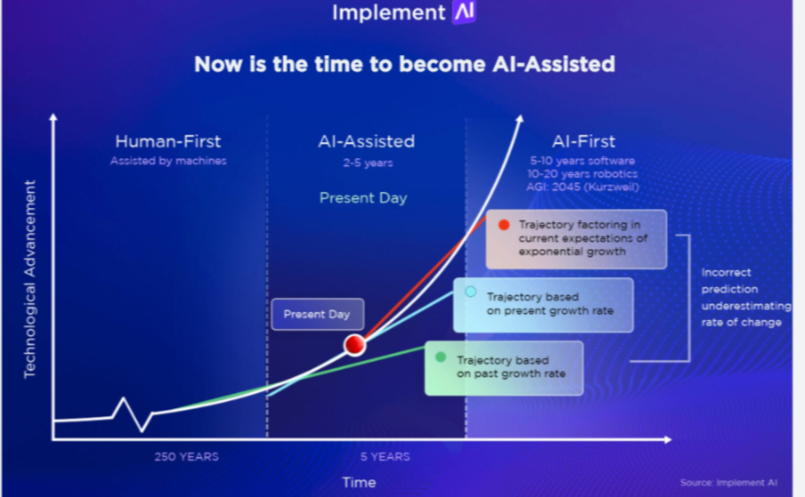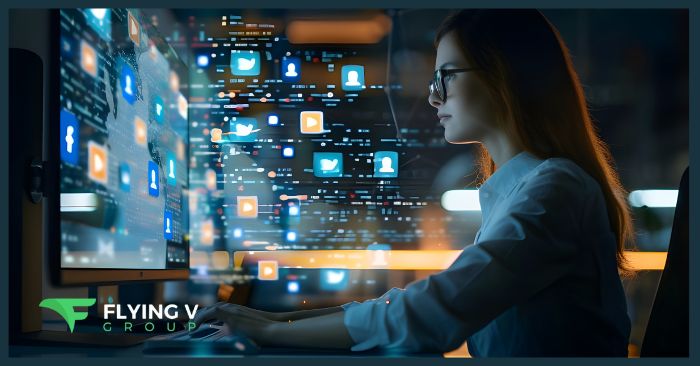Artificial Intelligence (AI) is revolutionizing digital marketing, particularly within content marketing.
As you strive to captivate and engage your audience, AI emerges as a powerful tool in content marketing, enhancing content creation, optimization, and personalization. Today, content marketing isn’t just beneficial; it’s essential for staying relevant and resonating with your audience.
Partnering with Flying V Group allows you to harness these AI capabilities. Their expertise in integrating AI into comprehensive marketing strategies ensures you meet and exceed your marketing goals, delivering true ROI through innovative solutions.
What is AI in Content Marketing?
AI in content marketing refers to using sophisticated algorithms and machine learning technologies to automate and enhance content creation and distribution. AI helps you tailor and optimize your content strategies to better meet your audience’s needs, driving engagement and boosting conversions.
Key AI technologies utilized in content marketing include:
- Machine Learning enables your systems to learn from data patterns and improve over time without being explicitly programmed. For instance, machine learning can help identify the most effective types of content based on user interaction and engagement, allowing you to refine your content strategy dynamically.
- Natural Language Processing (NLP): NLP tools are used to understand, interpret, and generate human language in a valuable way for creating high-quality, readable content. This technology powers content generation tools that can draft blog posts, social media updates, and reports, mimicking a natural tone that resonates with your target audience.

- AI-Powered Analytics: These tools analyze data on how content performs, providing insights into which topics capture attention and which formats are most effective. They help you optimize your content for better performance.
Benefits of AI in Content Marketing
- Increased Efficiency: AI automates numerous content marketing tasks, streamlining the creation and scheduling of content. AI tools can generate written content, suggest optimal posting schedules based on audience activity, and even automate content distribution across multiple channels.
This automation reduces the manual effort required and speeds up the production process, allowing marketing teams to focus on strategy and creative tasks.
- Enhanced Personalization: AI excels in analyzing user data to tailor content according to individual preferences and behaviors. By integrating AI, you can deliver highly personalized content experiences at scale.
For instance, AI algorithms analyze past interactions to determine what type of content is most engaging for each user, enabling the delivery of customized emails, recommended articles, and targeted ads that resonate more deeply with the audience.
- Improved Content Quality: AI’s ability to analyze large sets of performance data helps refine content quality. Tools equipped with AI assess what topics are trending, which headlines perform better, and what type of content generates more engagement. This analysis leads to producing content that is relevant and more likely to captivate and engage the target audience.
Scalability:
- Content Volume: AI helps scale content creation without sacrificing quality. As your audience and content needs grow, AI can assist in maintaining a steady stream of high-quality content without requiring proportional increases in human resources.
- Content Adaptation: AI can quickly adapt content for different platforms and formats, ensuring consistent messaging across all channels.
Use Cases of AI in Content Marketing
A. Content Creation
Automated Writing Tools: AI has revolutionized the way content is created. Tools like OpenAI’s GPT (Generative Pre-trained Transformer) can draft articles, blogs, and reports based on minimal input keywords or phrases. This allows you to produce quality drafts quickly, which can be fine-tuned for tone and style, saving you considerable time and effort.
AI-driven Video and Image Creation: Creating visually appealing content can be resource-intensive. AI helps streamline this by generating images and video content. AI-based tools like Lumen5 transform text content into engaging videos, making it easier for you to produce attractive and effective media in conveying your message.

B. Content Curation
Identifying Trending Topics and Relevant Content: AI tools scan the web to identify trends and popular content within your industry. This capability lets you stay ahead of the curve by incorporating the latest topics into your content strategy, ensuring relevance and timeliness.
Personalized Content Recommendations: AI algorithms analyze user behavior to recommend content that matches their interests. This is similar to how streaming services suggest movies and shows. For you, it means offering your audience more of what they like, which enhances engagement and user satisfaction.
C. SEO and Content Optimization
AI in Keyword Research and SEO Optimization: AI tools provide advanced keyword insights and competitive analysis, helping you identify which terms will drive traffic and structure your content for improved SEO performance. This includes suggestions for keyword density, meta tags, and optimizing content for voice search and other new search technologies.
Use of AI in A/B Testing for Content Effectiveness: Traditional A/B testing can be cumbersome and time-consuming. AI speeds up the process by automating the testing of different content versions across various parameters. This not only helps in determining the most effective content elements but also in implementing the winning strategies faster.
D. Audience Analysis
AI-powered Analytics for Understanding Audience Behavior and Preferences: By integrating AI with analytics tools, you gain deeper insights into how your content performs and how audiences interact with it. AI helps track user engagement across platforms, providing a holistic view of effectiveness and areas for improvement.
Tailoring Content Strategies Based on AI Insights: AI’s real power lies in its ability to analyze data and provide actionable insights. These insights allow you to tailor your content strategies dynamically. Whether you’re tweaking your content calendar, adjusting your content mix, or even personalizing content for different audience segments, AI provides the intelligence to make informed decisions.
Challenges and Considerations
Ethical Considerations in AI Content Creation: One of the primary concerns is the authenticity and integrity of AI-generated content. While AI can produce content at an impressive speed, ensuring it aligns with ethical standards and accurately represents your brand’s voice is crucial. There’s a fine line between using AI to assist in content creation and misleading your audience with fabricated or biased information. You must maintain transparency about the use of AI, ensuring your audience understands when content has been AI-generated.
Challenges Related to Data Privacy: AI systems require large amounts of data to function effectively, which raises significant privacy concerns. Handling customer data responsibly is paramount. To protect your audience’s privacy, you must comply with data protection regulations like GDPR and ensure that all AI tools comply with these laws.
Accuracy of AI-Generated Content: Another challenge is ensuring the accuracy and relevance of AI-generated content. AI tools may sometimes generate inaccurate or contextually inappropriate content, risking your brand’s credibility. Regularly monitoring and auditing AI-generated content are necessary to maintain quality and relevance.
Future Trends in AI and Content Marketing
The evolution of AI technologies is poised to bring even more sophisticated tools that will enhance your ability to engage with audiences at a deeper level.

One major trend is the increasing use of AI for enhanced personalization. Future AI tools will be able to analyze user behavior and preferences with greater precision, allowing for the creation of highly customized content that speaks directly to the interests and needs of individual users.
This means you’ll be able to deliver content that engages and converts at higher rates by resonating more strongly with your audience.
Additionally, AI is set to improve content interactivity. Imagine interactive videos or dynamic infographics that adapt in real-time based on viewer interactions. Such tools will make your content more engaging, providing immersive experiences that boost user retention and satisfaction.
Voice search optimization is another area where AI will expand its influence. As voice-activated assistants become more prevalent, AI will help optimize content specifically for voice queries, ensuring your content remains accessible and visible regardless of how the audience chooses to access information.
Elevate Your Content Strategy Using AI with FVG
The transformative impact of AI in content marketing is undeniable. It offers unprecedented efficiency, personalization, and scalability.
As the digital landscape evolves, embracing AI technologies becomes crucial to staying competitive and enhancing your strategic approach.
Partner with Flying V Group, whose expertise in integrating AI into comprehensive marketing strategies ensures you keep pace and lead the charge in innovation.
Our tailored solutions will maximize your ROI. They leverage the power of AI in content marketing to elevate your brand and engage your audience more effectively than ever before.
FAQs
1. What is AI in content marketing?
AI in content marketing involves using artificial intelligence technologies to automate, personalize, and optimize content creation and distribution, helping marketers efficiently reach and engage their target audience with relevant content.
2. How does AI enhance content personalization?
AI analyzes user data to tailor content to individual preferences and behaviors, ensuring that each piece of content resonates personally with the audience, which can significantly improve engagement rates and customer satisfaction.
3. Can AI improve content creation efficiency?
Yes, AI streamlines the content creation process by automating routine tasks such as data analysis, content drafting, and scheduling, allowing marketers to focus on strategy and creative endeavors, thereby boosting productivity.
4. What role does AI play in SEO and content optimization?
AI tools help identify optimal keywords, analyze content effectiveness, and automate A/B testing, enabling marketers to optimize their content for better search engine rankings and user engagement.
5. Are there ethical concerns with using AI in content marketing?
Yes, ethical concerns include ensuring the accuracy of AI-generated content and maintaining transparency about AI’s role in content creation to avoid misleading audiences while also responsibly managing user data to protect privacy.






0 Comments